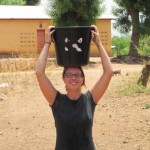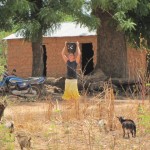Things I am completely accustomed to doing and seeing on an everyday basis:
-facial and body scarification (this is to identify natal villages, others are ritualistic and for protection).
-babies and small children on motorcycles, in between the driver and the handlebars.
-trash heaped EVERYWHERE; on the side of the road, outside houses, all over the market…
-drinking out of a plastic bag, eating with my hands.
– women peeing standing up with no attempt to conceal it or let it interrupt the journey to their destination (and surprisingly revealing nothing inappropriate…they are my heroes).
-Babies with tar or clay covering their cranial soft spots (to keep spirits out).
– Taxis filled with twice the normal number of occupants and piled twice its height with cargo.
-Giving babies and small children alcohol; tchouck, beer, hard alcohol (?! albeit small amounts, but some more than others if they hang around the tchouck stands long enough).
– Ritual/purposeful animal slaughter.
-Chickens died pink to identify them (first time I saw this was in Kara, the chickens were eating from some seriously toxic looking sludge and for a minute I questioned the cause of the color…).
-Kids, from three and up, with babies half their size wrapped onto their backs.
-Day to day health and safety precautions…everything can become a habit surprisingly easy with time.
-Burning my trash, it sounds counter-intuitive to my work here but there is really no other option.
-Realizing that African people are the experts at recycling and ‘green living’ because there is no other way.
-Community living. It is beautiful.
Things I have yet to normalize:
-The immense patience and nerves of steel it takes to travel through country here, but I am getting much better.
-The chaos of open-air bazaar style markets- also getting quickly adjusted to this.
-Kids doing manual labor in lieu of class (Travailler manuel- Manual labor days, twice a month for the teachers and school grounds. Kids are also go-to’s for all errands and any work an adult can convince them to do. They are tireless.).
-The immense about of labor women and girls do each day, and how physically strong they are!
-Untreated, serious maladies both physical and chronic.
-The attitudes of Togolese men.
-Dogs, and various other animals, constantly being hit, or nearly hit and injured by motos and vehicles.
-Flies, everywhere, all the time. On my legs, on my face, on my food, on my dinnerware, trying to fly up my nose…everywhere.
-People staring at my hair and asking me where I got it and to give it to them after I cut it off.
-Bleaching cream, if I know how to make it and people asking me about the machine that can make their skin like mine. “You know, like the one that Michael Jackson used.”
Food:
Togolese staples include (in order of preference):
Watche- rice and beans
Soja- fried tofu with piment (crushed red pepper and oil)
Wagash- fried cheese, (think rubbery mozzarella), often coupled in tomato sauce hard to find all the time because it is made/sold by the Fulani people who are nomadic cattle herders from the North African countries. You can also buy it fresh, take it home, boil it and crumble on to salads like feta.
Fufu- pounded yam/igname (starchy oblong, up to two feet!, potato, not sweet and very dry) mixed with water, think very thick mashed potato eaten with variety of sauces.
Koliko- fried yam…Togolese French fries, also served with piment.
Maca(short for macaroni)- this includes all variety of pasta but generally implies spaghetti noodles normally served with some other starch at the same time, rice, koliko etc. Not always with any type of sauce and often cold.
Pâte- least favorite, essentially any type of flour mixed with boiling water and then formed into starchy- mush-mold, served with sauce and always burns my fingers! This is what I make to feed to my pets.
Sauces are:
Tomato sauce- made with tomato paste and a lot of piment- super hot peppers!!! (my favorite, I literally can’t get enough of it).
Sauce gluant- a couple of different varieties some with okra, others with various native plant leaves…all create a green sauce resembling the consistency of snot, and lacking much taste but probably the most nutritious.
Meats: (I don’t eat any but for common knowledge/interest…)
Crushed and dried fish, put in many sauces and only noticeable by aroma and shiny scales here and there.
Pintad- guinea fowl, supposedly delicious and preferred over chicken.
Chicken, Pork, Beef (Latter two are generally hard for villagers to buy unless it is for a fête, or any meat for that matter).
**most meats are in small quantities and mixed in with the sauces…unless you are at a restaurant in the city or around city living Togolese, which is a whole other world.
Things I cook when I have the energy:
Soup- French onion, cream of onion, potato, carrot, cream of tomato… I like soup.
Breakfasts: Home fries, veggie scrambles, rice pudding from leftover dinner rice, oatmeal, egg sammys with Togolese buns*. If I have guests I might make peanut butter pancakes, crêpes, or French toast.
Lunches: Salads!- when veggies are available, salsa, refried beans, queso dip, guacamole (avocados in the South are a dollar right now!) all with homemade tortillas, peanut butter and jelly sandwiches.
Dinners: rice, beans, cream of mushroom pasta, pad-Thai (or something like it), stir fry, salad, soup, lemon cream pasta (divine), macaroni and cheese.
Desserts: chocolate cake, peanut butter oatmeal no-bake cookies, lemon cake, zucchini bread, banana fritters, banana bread.
Beverages: delicious locally grown coffee, solar tea, sangria.
Things I would like to make but haven’t tried out yet:
pizza, jams and marmalades (coming soon with all the mangos that are about to be ripe in my compound), squash gnocchi (also hopefully soon with squash soon to be ready in my garden), bagels, polenta (should be super easy because I go to mill to grind my own corn flour so I can grind it less to make cornmeal), soja tacos- implies corn tortillas, see previous comment.
*They make good bread here, it is all white bread but at least we have bread, many P.C. countries do not and it is one thing you can eat when you don’t feel like cooking and heating up the house. Most villages do not have bread to buy and you have to buy it at the weekly markets. I am lucky though Sun. and Mon. there is a woman who makes bread in Ataloté and it is by far the best and freshest I have found.
**I usually only have time and supplies to make one to two of these types of meals. i.e. I will make a big breakfast and finish it for lunch or make a big lunch to finish for dinner. I can get a lot of ‘Western’ type food and supplies in the bigger cities but it gets pricey and perishables go bad fast. It is amazing though what you can get away with not refrigerating that we refrigerate in the States (i.e. eggs, ketchup, jam, veggies, mayo/all condiments). Cooking is a hobby that many volunteers relish and indulge…seeing as sometimes it is a good way to pass the time, not to mention delicious.

